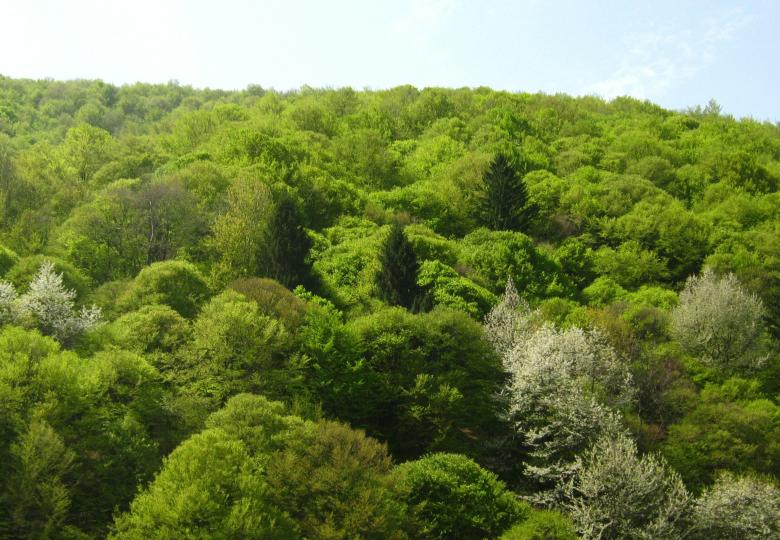Developing nature-friendly solutions to protect forests against climate change whilst maintaining their economic value across Europe and China
The eco2adapt project is about finding eco-friendly ways to protect our forests in Europe and China. It aims to ensure we plant the right trees in the right places, considering Nature and biodiversity. It wants to create smart and practical solutions that will help our forests thrive for future generations. With the support of local communities, the project is working on new ideas for managing forests to keep them healthy and resilient in the face of challenges such as climate change.
- Resilience – To help stakeholders manage forest systems to optimise social and ecological resilience.
- Biodiversity – To provide stakeholders with novel tools for measuring, monitoring and understanding the influence of adaptive forestry on above- and below-ground biodiversity and invasive species.
- Policy – To help policy-makers at regional, national, European and Chinese scales better predict the impact of policies on social-ecological resilience, biodiversity, climate change adaption and economy.
- Stakeholders – To overcome bottlenecks preventing widespread implementation of adaptive forestry through Living Labs gathering stakeholders who impact social-ecological forest systems.
- Data – To provide current and future researchers and policy-makers with FAIR (findable, accessible, interoperable, and reusable) data.
- Decision-making – To provide innovative change-making mechanisms for decision-makers (at all levels, from local communities to governments) that will improve social-ecological resilience.
- Adaptation – To give ecosystem-based adaptation a prominent place in forest society.
Changemaking to create a new future for forests
The European Union pledges to plant 3 billion trees by 2030, but Chinese foresters have shown that a ‘one size fits all’ afforestation approach does not work. Tree plantations can be destroyed through climatic events such as storms or drought or be attacked by pests and pathogens, leaving a devastated landscape and despairing local communities. Resilient forest management requires locally tailored solutions.
Using an Ecosystem-based Adaptation (EbA) approach that considers biodiversity and Nature’s benefits to humans, eco2adapt will consider not only the trees but the gain for the entire social-ecological system so local communities can contribute to safeguarding tomorrow’s multifunctional forests. EbA offers cost-effective and sustainable solutions for national and regional #adaptation strategies. However, understanding societal perception and acceptability is necessary before both citizens and governments can implement EbA solutions. Through innovative Decision Theatres, eco2adapt will work with stakeholders to understand what drives their decision-making and create changemaking models and policies for resilient forest management, business and governance.
Smart tools to create and manage resilient forests
The eco2adapt consortium will develop digital tools using cutting-edge artificial intelligence methods to harness information from Big Data in forestry archives worldwide. Combined with sophisticated modelling to predict the effects of management on forest dynamics in a changing climate and how this will affect services and contributions to people. Information will be used to create portfolios of climate-resilient species and management methods to be accessed via a free Smartphone application. The application will help forest managers choose the best species/mixture of species to plant depending on local conditions, climate projections and community needs.
Tailored innovation through Living Labs in climate hotspots
eco2adapt will co-create solutions for resilient forests with stakeholders in 15 climate hotspots in Europe and China. Living Labs will be set up in each hotspot to allow collaborations between multiple partners operating at regional or landscape levels and to coordinate experiments. eco2adapt’s Living Labs have been selected to cover a broad range of forest and climate types, from boreal and temperate conifer forests to tropical rainforests.
Animal and plant biodiversity will be monitored through citizen science, remote sensing and experiments. EbA-style management will be tested at experimental sites, and the best solutions will be demonstrated at lighthouse sites, with EbA training given to stakeholders. Living Lab activities will allow stakeholders to learn about new solutions across Europe and China, including novel forest insurance and business mechanisms, certification schemes and policy updates.
Shaping a legacy for resilient forests at all levels of society
As change-making takes time, eco2adapt will create a legacy for future scientists, stakeholders, practitioners, students and communities. eco2adapt will develop activities and materials for all levels of society, from children to retirees and foresters to policy-makers. Digital tools developed and data created will be accessible and will evolve after the project ends. They will be made open-access and interactive via a Knowledge Base. A direct link will be made between the project’s knowledge base and the United Nations Data Hub so policy-makers can constantly access forestry and #ecosystemservice data. This will strengthen partnerships between academics, practitioners and policy-makers and create a long-term legacy for tomorrow’s generations.
Partners in the eco2adapt project consortium:
- INRAE - Institut National De Recherche Pour L'agriculture L'alimentation Et L'environnement
- CIRAD - Centre De Cooperation Internationale En Recherche Agronomique Pour Ledeveloppement - C.I.R.A.D. Epic
- UEF - Ita-Suomen Yliopisto
- GCF - GCF - Global Climate Forum Ev
- EFI - European Forest Institute
- IRD - Institut De Recherche Pour Le Developpement
- UM - Universite De Montpellier
- ALUFR - ALBERT-LUDWIGS-UNIVERSITAET FREIBURG
- AUA - Geoponiko Panepistimion Athinon
- NBSI - NBS Institute AB (SVB)
- BITCOMP - BITCOMP OY
- UNIFI - Universita Degli Studi Di Firenze
- INNOVASILVA - INNOVASILVA APS
- IMSI - Institut Za Multidisciplinarna Istrazivanja
- FFC - Suomen Metsakeskus-Finlands Skogscentral
- VMU - Vytauto Didziojo Universitetas
- MPG - Max-Planck-Gesellschaft Zur Forderung Der Wissenschaften Ev
- CTFC - Consorci Centre De Ciencia I Tecnologia Forestal De Catalunya
- UNITBV - Universitatea Transilvania Din Brasov
- INRAE-T - Inrae Transfert Sas
- ONF - Office National Des Forets
- GREEN ESTATES - Green Estates Oy
- PBN - NEPCON FMBA
- ETHZ - Eidgenoessische Technische Hochschule Zuerich
- CAF - Chinese Academy of Forestry
- ICBR - International Centre for Bamboo and Rattan
- ZAFU - Zhejiang A&F University
- SCBG-CAS - South China Botanical Garden, Chinese Academy of Sciences
- PKU - Peking University
- CSUFT - Central South University of Forestry and Technology
- FORRE - Forestre Limited
Together we are stronger

Maliau Basin’s next decade: A strategic plan for Ecosystem Restoration Excellence
This decade-long strategic plan will restore degraded forest areas, strengthen ecological corridors, and establish Maliau Basin as...

Developing nature-friendly solutions to protect forests against climate change whilst maintaini...
The eco2adapt project is about finding eco-friendly ways to protect our forests in Europe and China. It aims to ensure we plant th...

Revitalising the Silam Coast Conservation Area for a sustainable future
The Silam Coast Conservation Area (SCCA) Restoration Project is an eight-year collaborative initiative between Preferred by Nature...

Sustainable Management of Small Forest Properties for Resilient Forests in Europe (SMURF)
Europe's forests, crucial for their ecological and economic value, face mounting threats. Climate change fuels extreme weather eve...
